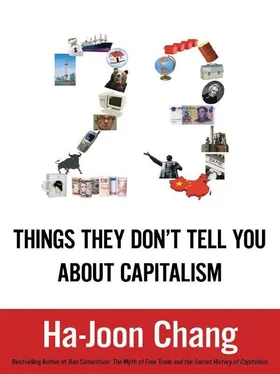So Chrysler, once one of the quintessential American companies, has in the last decade come to be run by Germans, Americans (again) and (increasingly) Italians. There is no such thing as ‘nationless’ capital. When taken over by a foreign company, even mighty (former-)American firms end up being run by foreigners (but then that is what takeover means, when you think about it). In most companies, however transnational their operations may seem, the top decision-makers still remain the citizens of the home country – that is, the country where ownership resides – despite the fact that long-distance management (when the acquiring company does not dispatch top managers to the acquired firm) can reduce management efficiency, while dispatching top managers to a foreign country is expensive, especially when the physical and the cultural distances between the two countries are great. Carlos Ghosn is very much an exception that proves the rule.
It is not just in terms of the appointment of top decision-makers that corporations have a ‘home bias’. Home bias is also very strong in research and development, which are at the core of a company’s competitive strengths in most advanced industries. Most of a corporation’s R&D activities stay at home. Insofar as they are relocated abroad, it is usually to other developed countries, and at that with a heavy ‘regional’ bias (the regions here meaning North America, Europe and Japan, which is a region unto itself in this respect). Recently an increasing number of R&D centres have been set up in developing countries, such as China and India, but the R&D they conduct tends to be at the lowest levels of sophistication.
Even in terms of production, arguably the easiest thing that a company does and therefore the most likely candidate for relocation abroad, most transnational corporations are still firmly based in their home countries. There are odd examples of firms, for instance Nestlé, which produce most of their outputs abroad, but they are very much the exception. Among US-based transnational corporations, less than one-third of the output of manufacturing firms is produced overseas. In the case of Japanese companies, the ratio is well below 10 per cent. In Europe, the ratio has risen fast recently, but most overseas production by European firms is within the European Union, so it should be understood more as a process of creating national firms for a new nation called Europe than as a process of European firms going truly transnational.
In short, few corporations are truly transnational. The vast majority of them still produce the bulk of their outputs in their home countries. Especially in terms of high-grade activities such as strategic decision-making and higher-end R&D, they remain firmly centred at their home countries. The talk of a borderless world is highly exaggerated. [24] For further evidence, see my recent book Bad Samaritans (Random House, London, 2007, and Bloomsbury USA, New York, 2008), ch. 4, ‘The Finn and the Elephant’, and R. Kozul-Wright and P. Rayment, The Resistible Rise of Market Fundamentalism (Zed Books, London, 2007), ch. 4.
Why is there a home-country bias?
Why is there a home-country bias in this globalized world? The free-market view is that nationality of capital does not – and should not – matter, because companies have to maximize profit in order to survive and therefore that patriotism is a luxury they can ill afford. Interestingly, many Marxists would agree. They also believe that capital willingly destroys national borders for greater profits and for the expanded reproduction of itself. The language is radically different, but the message is the same – money is money, so why should a company do less profitable things simply because they are good for its home country?
However, there are good reasons why companies act with home-country biases. To begin with, like most of us, top business managers feel some personal obligations to the society they come from. They may frame such obligations in many different ways – patriotism, community spirit, noblesse oblige , or wanting to ‘return something to the society that has made them what they are today’ – and may feel them to different degrees. But the point is that they do feel them. And insofar as most top decision-makers in most companies are home-country nationals, there is bound to be some home-country bias in their decisions. Although free-market economists dismiss any motive other than pure self-seeking, ‘moral’ motives are real and are much more important than they lead us to believe ( see Thing 5 ).
On top of those personal feelings of managers, a company often has real historical obligations to the country in which it has ‘grown up’. Companies, especially (although not exclusively) in the early stages of their development, are often supported with public money, directly and indirectly ( see Thing 7 ). Many of them receive direct subsidies for particular types of activities, such as equipment investment or worker training. They sometimes even get bailed out with public money, as Toyota was in 1949, Volkswagen in 1974 and GM in 2009. Or they may get indirect subsidies in the form of tariff protection or statutory monopoly rights.
Of course, companies often fail to mention, and even actively hide, such history, but there is an unspoken understanding among the relevant parties that companies do have some moral obligations to their home countries because of these historical debts. This is why national companies are much more open to moral suasion by the government and the public than foreign companies are, when they are expected, although cannot be legally obliged, to do something for the country against their (at least short-term) interests. For example, it was reported in October 2009 that South Korea’s financial supervisory agency was finding it impossible to persuade foreign-owned banks to lend more to small and medium-sized companies, even though they, like the nationally owned banks, had already signed an MOU (memorandum of understanding) about that with the agency, when the global financial crisis broke out in the autumn of 2008.
Important though the moral and historical reasons are, by far the most important reason for home-country bias is economic – the fact that the core capabilities of a company cannot be easily taken across the border.
Usually, a company becomes transnational and sets up activities in foreign countries because it possesses some technological and/or organizational competences that the firms operating in the host countries do not possess. These competences are usually embodied in people (e.g., managers, engineers, skilled workers), organizations (e.g., internal company rules, organizational routines, ‘institutional memory’) and networks of related firms (e.g., suppliers, financiers, industrial associations or even old-boy networks that cut across company boundaries), all of which cannot be easily transported to another country.
Most machines may be moved abroad easily, but it is much more costly to move skilled workers or managers. It is even more difficult to transplant organizational routines or business networks on to another country. For example, when Japanese automobile companies started setting up subsidiaries in Southeast Asia in the 1980s, they asked their subcontractors also to set up their own subsidiaries, as they needed reliable subcontractors. Moreover, these intangible capabilities embodied in people, organizations and networks often need to have the right institutional environment (the legal system, informal rules, business culture) in order to function well. However powerful it may be, a company cannot transport its institutional surroundings to another country.
For all these reasons, the most sophisticated activities that require high levels of human and organizational competences and a conducive institutional environment tend to stay at home. Home biases do not exist simply because of emotional attachments or historical reasons. Their existence has good economic bases.
Читать дальше






![Ally Carter - [Gallagher Girls 01] I'd Tell You I Love You But Then I'd Have to Kill You](/books/262179/ally-carter-gallagher-girls-01-i-d-tell-you-i-lo-thumb.webp)





